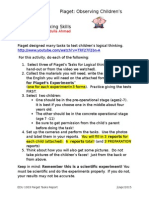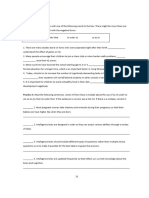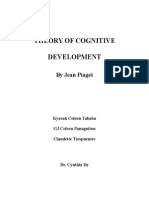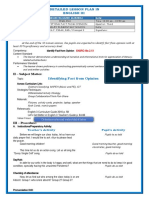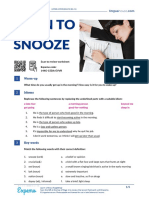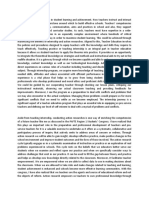The Desire To Learn
The Desire To Learn
Uploaded by
nejlaCopyright:
Available Formats
The Desire To Learn
The Desire To Learn
Uploaded by
nejlaOriginal Description:
Original Title
Copyright
Available Formats
Share this document
Did you find this document useful?
Is this content inappropriate?
Copyright:
Available Formats
The Desire To Learn
The Desire To Learn
Uploaded by
nejlaCopyright:
Available Formats
THE DESIRE TO LEARN
For some time past it was believed that babies learn to do things because they receive
'rewards'. There is no reason to doubt that this is true. However, most people believed that in the
early stages of development a baby would learn if he got food or drink or some sort of physical
comfort as a reward and not for any other reason.
It is now clear that this is not so. Babies will learn with no reward except the successful
outcome. At a very early age, human babies show a will to master the environment. They are limited
in what they can do by their slow physical development. Therefore, it is even more interesting to see
that this will to master the environment is already present at this time of helplessness. This urge
seems to depend on only one reward, that of achieving competence and control of the environment.
There are some interesting experiments done by Hanus Papoušek.
In the first experiment Papoušek wanted to teach babies to turn the head to one side or the
other. As a reward, he gave them milk. Then he noticed that a baby who had had enough milk to
drink would go on making the learned responses with pleasure. So he began to study situations when
no milk was given.
He constructed a series of electric lights which were switched on when the babies moved their
heads. They would smile and babble when they saw the lights, but it was not only the lights which
pleased them. They were happy because they solved a problem. They succeeded in mastering a skill.
If Papoušek is right in this we can say that there exists a fundamental human urge to make sense of
the world and bring it under control.
Children's Minds
by Margaret Donaldson, 1978
Terminology
reward /rɪˈwɔːd/ - nagrada
stages of development /'steidʒiz ǝv di'velǝpment/ - stupnjevi /stadiji razvoja
master the environment /in'vaiǝrnmǝnt/ - ovladati okolinom
urge /ǝ: dʒ/ - snažna pobuda / potreba
competence /'kompitǝns/ - kompetencija / sposobnost
achieving /ǝ'tʃi:viŋ/ of competence – postizanje kompetencije
response /ri'spons/ - odgovor, reakcija
learned responses – naučeni odgovori
master a skill – ovladati vještinom
exist /ig'zist/ - postojati
fundamental human urge /ˌfʌn.dəˈmen.tǝl hjumǝn ǝ: dʒ / - fundamentalna (osnovna) ljudska
potreba
Phrases:
solve a problem – find the answer to a problem
make sense of – understand
bring (something) under control – master / dominate (something)
EXERCISES:
I – Analysis of the ideas and relationships: Circle the letter next to the best answer.
1. I would say that the main idea in this text is that:
a) human babies do not need rewards in order to learn
b) Papoušek proved that babies like to move their heads to the right and left
c) there is a strong desire to learn in human babies
2. Explain what the word 'this' in line 2 and in line 5 refers to.
3. Circle the letter next to the best answer.
In line 9 the word 'that' refers to:
a) the urge
b) the reward
c) the control
In the last line 'it' refers to:
a) human urge
b) sense
c) world
4. Can this text be divided into two parts? If you think it can, where does the first part end and
the second begin? Give your own subtitles for them.
5. TRUE or FALSE:
a) A baby cannot solve a problem.
b) Babies show a will to master the environment.
c) Papoušek carried out 3 experiments.
d) Some people believed that babies wanted food or drink or some sort of physical comfort
as a reward and nothing else.
6. Try to get some information: Imagine you were talking to Hanus Papoušek. What questions
would you ask him about his experiments?
7. Try to give some information: Describe papoušek's experiments in a simple way.
8. SUMMARY:
For some time it was ___________ that babies would ___________ if they got ____________
or ______________ or some sort of physical ____________ as a reward. However, babies
show a __________ to master the environment. There is a fundamental ____________ urge
to understand the world and bring it __________ control.
II – WORD STUDY:
A - Write the correct word form to complete each sentence. If you are not sure about your
choice, use your dictionary.
development, develop, developmental
Dr Doland is trying to _____________ a new method.
There are always new ______________ in scientific experiments.
In teacher-training colleges students learn _____________ psychology.
movement, move, movable
Let's buy a doll with ___________ eyes for Georgina.
The babies' __________ made the lights turn on.
The child ___________ in her/his sleep.
achievement, achieve, achievable
To ___________ results, we must study.
His latest book was his greatest ____________.
Many goals in life are ______________.
response, respond, responsive
A stimulus will make a __________.
Most people ____________ with a laugh to children's sayings.
Some children have a very ____________ nature and soon become fond of their teachers.
existence, existentialism, exist, existant
The child asked: 'Do fairies _________?'
Human ____________ depends on air and water.
_______________ is a 20th century philosophy.
This is the only ______________ portrait of William Shakespeare.
Now read again the above examples and make a list of suffixes to form (a) nouns and (b)
adjectives:
a. ____________________________________________
b. ____________________________________________
B – Can you notice something special about the word series in the following two
sentences?
There is a new TV series starting this week.
The last two series were very good.
Make two sentences on your own.
C – SENTENCE:
It is (not) ... It was (not) ... which / that / who ...
It was not only the lights which pleased the babies.
The structure is used for emphasis. Compare the sentences:
'It is a wise father who knows his son', said Shakespeare.
It is 'Cinderella' that I like best of all fairy tales.
It was Charles Dickens who demanded education for poor children.
A wise father knows his son.
I like 'Cinderella' best of all fairy tales.
Charles Dickens demanded education for poor children.
Restate these sentences by giving them emphasis:
Dr Margaret Donaldson is a Reader in psychology at the University of Edinburgh.
Piaget's research institute is in Geneva.
Jerome Briner is famous for his work in education.
The knowledge of foreign languages helps people to communicate.
The body language is not the same in all the cultures.
Make two sentences of your own.
A study of children learning must start with the baby, because this is
where all learning begins.
Alice Yardley
You might also like
- Elm-560-T5-Math Unit Plan FinalDocument8 pagesElm-560-T5-Math Unit Plan Finalapi-433533218100% (1)
- Speech and Language Stimulation Techniques For ChildrenDocument18 pagesSpeech and Language Stimulation Techniques For ChildrenKUNNAMPALLIL GEJO JOHN91% (23)
- Piagets Task Observation FormDocument12 pagesPiagets Task Observation Formapi-297399477No ratings yet
- Three Days To SeeDocument4 pagesThree Days To Seenejla0% (1)
- Direct Instruction ModelDocument13 pagesDirect Instruction Modeljoreina ramos100% (1)
- Module 7 Students Who Are Gifted and TalentedDocument47 pagesModule 7 Students Who Are Gifted and TalentedChristy69% (13)
- Final John ESR-SampleDocument11 pagesFinal John ESR-SampleDebilyn143No ratings yet
- Lesson Plan Inferences 2Document2 pagesLesson Plan Inferences 2api-347123122No ratings yet
- Lesson Plan 3Document5 pagesLesson Plan 3api-295499931No ratings yet
- DAY 2 InterDocument3 pagesDAY 2 InterMèo MeoNo ratings yet
- Színes Érettségi Feladatsorok Színes Érettségi FeladatsorokDocument4 pagesSzínes Érettségi Feladatsorok Színes Érettségi FeladatsorokSzabó ÁgnesNo ratings yet
- Amanda Howard - The Human Spark ResponseDocument3 pagesAmanda Howard - The Human Spark Responseapi-552776221No ratings yet
- English 9 - Q1M2 - Using Conditionals in Expressing ArgumentsDocument19 pagesEnglish 9 - Q1M2 - Using Conditionals in Expressing ArgumentsJulie Jane GonzagaNo ratings yet
- GW HW MehmetegeipekDocument7 pagesGW HW Mehmetegeipekkuruyemis0101No ratings yet
- Engleski Jezik Odgojiteljske Struke 2Document26 pagesEngleski Jezik Odgojiteljske Struke 2lollaNo ratings yet
- Facilitating Learning Modules 3 4Document35 pagesFacilitating Learning Modules 3 4Nicole rivera modequilloNo ratings yet
- Focus On The Learning: Piagets'S Stages of Cognitive DevelopmentDocument34 pagesFocus On The Learning: Piagets'S Stages of Cognitive DevelopmentRiza Mae Prudente OrtegaNo ratings yet
- 1100 Life Span Class AssnmntDocument4 pages1100 Life Span Class Assnmntapi-251996923No ratings yet
- AnglaisDocument4 pagesAnglaisegfzgzegzeNo ratings yet
- Lifespan Development Canadian 5th Edition Boyd Test Bank 1Document36 pagesLifespan Development Canadian 5th Edition Boyd Test Bank 1justinfleminggfcqziaonr100% (52)
- Facilitating Learning Let ReviewDocument59 pagesFacilitating Learning Let ReviewAbemar Roa Jose50% (2)
- Child and Adolescent DevelopmentDocument11 pagesChild and Adolescent DevelopmentChristine A. Delos SantosNo ratings yet
- Republic of The Philippines Department of Education Region IV - A Calabarzon Division of LagunaDocument24 pagesRepublic of The Philippines Department of Education Region IV - A Calabarzon Division of LagunaQueenie Anne Barroga AspirasNo ratings yet
- Lesson Plan Grade IV - Disguishing Fact From OpinionDocument7 pagesLesson Plan Grade IV - Disguishing Fact From OpinionEdna DagondongNo ratings yet
- Science Lesson Plan 2022Document3 pagesScience Lesson Plan 2022api-712048645No ratings yet
- Lesson Plan - Health 2 2ND QTR RizanoDocument5 pagesLesson Plan - Health 2 2ND QTR Rizano127003No ratings yet
- Module 12 - Cognitive Development of Preschoolers: Learning OutcomesDocument16 pagesModule 12 - Cognitive Development of Preschoolers: Learning Outcomestaw realNo ratings yet
- Giao Trinh TATE, Module 1Document28 pagesGiao Trinh TATE, Module 1Huỳnh Lê Quang ĐệNo ratings yet
- HumptyDocument3 pagesHumptyapi-351547400No ratings yet
- COGNITIVE DEVELOPMENT and CONSERVATION TASKS by JEAN PIAGETDocument3 pagesCOGNITIVE DEVELOPMENT and CONSERVATION TASKS by JEAN PIAGETamie_bautista_1100% (1)
- Touch and FeelDocument5 pagesTouch and Feelapi-459217235No ratings yet
- 3rd Summative Test For Grade 6 Set BDocument20 pages3rd Summative Test For Grade 6 Set BRhea Mae Saquibal GalleneroNo ratings yet
- Final English Grade 2 Q1 L4Document18 pagesFinal English Grade 2 Q1 L4Jin TabangayNo ratings yet
- My Reflections JGPBDocument11 pagesMy Reflections JGPBgabriel moonNo ratings yet
- SPED (Non-Graded) : Care Skills Module 2: Personal HygeneDocument24 pagesSPED (Non-Graded) : Care Skills Module 2: Personal HygeneAngel Jabines100% (2)
- Jean Piaget's Cognitive DevelopmentDocument9 pagesJean Piaget's Cognitive Developmentsambambidavid9No ratings yet
- English 7 Q1 - M4 For PrintingDocument17 pagesEnglish 7 Q1 - M4 For PrintingBerry Anne ZuelaNo ratings yet
- Ingles SeptimoDocument18 pagesIngles Septimomargarita giraldoNo ratings yet
- English 3 - Q2 - M17 v2Document17 pagesEnglish 3 - Q2 - M17 v2Angel RicafrenteNo ratings yet
- Lesson Plan Aug 22 Dezere C.Document6 pagesLesson Plan Aug 22 Dezere C.Dezere Amang CasimsimanNo ratings yet
- Theory of Cognitive Development - HardDocument12 pagesTheory of Cognitive Development - HardkyzeahNo ratings yet
- Piagets Task Observation FormDocument13 pagesPiagets Task Observation Formapi-281999660100% (3)
- Lesson Plans For Stress Debriefing and ProverbsDocument4 pagesLesson Plans For Stress Debriefing and ProverbsJayraldNo ratings yet
- Piagets Stages of Cognitive DevelopmentDocument4 pagesPiagets Stages of Cognitive DevelopmentBaby Jean RichaNo ratings yet
- I - Objective:: Identifying Fact From OpinionDocument5 pagesI - Objective:: Identifying Fact From OpinionKimos ES100% (2)
- Lion in A Jar LessonDocument2 pagesLion in A Jar Lessonapi-350754818No ratings yet
- Module 6Document15 pagesModule 6Jennelyn SorianoNo ratings yet
- Conservation Tasks PresDocument4 pagesConservation Tasks PresRachel BurrellNo ratings yet
- Aliment SDocument3 pagesAliment SAndrei BejenaruNo ratings yet
- q3 Week 8 Day 1-5 English VDocument58 pagesq3 Week 8 Day 1-5 English Vhonie aragoncilloNo ratings yet
- Literatura. LEC 2022Document23 pagesLiteratura. LEC 2022Emilia del CastilloNo ratings yet
- Stop Struggling in School Full EbookDocument108 pagesStop Struggling in School Full EbookKate Idzikowska0% (1)
- Reading Support and Homework Grade 6 Answers ScienceDocument7 pagesReading Support and Homework Grade 6 Answers Sciencezesym0lol0d3100% (2)
- Gaht 11Document43 pagesGaht 11Thuy anhNo ratings yet
- PsychologyDocument14 pagesPsychologynisalielisha rodrigoNo ratings yet
- David 5Document88 pagesDavid 5Bhumi GandhiNo ratings yet
- The Concept of Developmental-Tasks and Its Significance For Education and Social Work - Uhlendorff - Social Work & SocietyDocument5 pagesThe Concept of Developmental-Tasks and Its Significance For Education and Social Work - Uhlendorff - Social Work & SocietyAteh HashimNo ratings yet
- Therapy TechniquesDocument15 pagesTherapy TechniquesNishi JhaNo ratings yet
- Let Reviewer 2023Document8 pagesLet Reviewer 2023Stephane Grace LunetaNo ratings yet
- English V Cot 12024-2025Document44 pagesEnglish V Cot 12024-2025Evangeline AggariNo ratings yet
- Development - GCSE Psychology 9-1Document16 pagesDevelopment - GCSE Psychology 9-1Ranmika JayawardenaNo ratings yet
- Prof. Ed. 1 - Module 5Document5 pagesProf. Ed. 1 - Module 5Jomar NavarroNo ratings yet
- Enrichment of Vocabulary - Objects in EnvironmentDocument3 pagesEnrichment of Vocabulary - Objects in Environmentapi-734979884No ratings yet
- Mind in the Making: The Seven Essential Life Skills Every Child NeedsFrom EverandMind in the Making: The Seven Essential Life Skills Every Child NeedsRating: 4 out of 5 stars4/5 (35)
- Born To Snooze American English Student Ver2Document5 pagesBorn To Snooze American English Student Ver2nejlaNo ratings yet
- EXERCISE Past Simple vs. Past ContinuousDocument4 pagesEXERCISE Past Simple vs. Past ContinuousnejlaNo ratings yet
- GRAMMAR EXERCISES (Plural of Nouns, Present Simple and Present Continuous, Imperative)Document1 pageGRAMMAR EXERCISES (Plural of Nouns, Present Simple and Present Continuous, Imperative)nejlaNo ratings yet
- Exercises Perfect TensesDocument1 pageExercises Perfect TensesnejlaNo ratings yet
- EXERCISE Past Simple vs. Past ContinuousDocument4 pagesEXERCISE Past Simple vs. Past ContinuousnejlaNo ratings yet
- Scheme of Work MGT 162 Mac 2018Document4 pagesScheme of Work MGT 162 Mac 2018Nur IzzahlinaNo ratings yet
- Assessment Rubric DesignDocument4 pagesAssessment Rubric Designapi-302401183No ratings yet
- Lesson Plan - 1 PatternDocument4 pagesLesson Plan - 1 Patternapi-382182406No ratings yet
- Students Are Learning Where Animals Live and How They Use Their HabitatsDocument3 pagesStudents Are Learning Where Animals Live and How They Use Their HabitatsAnonymous w2Y92EBoqTNo ratings yet
- AB5C KeyDocument13 pagesAB5C Key7736468421No ratings yet
- Understand Language Skills READING AND WRITINGDocument11 pagesUnderstand Language Skills READING AND WRITINGSunil SagarNo ratings yet
- Expert Teachers: Their Characteristics, Development and AccomplishmentsDocument16 pagesExpert Teachers: Their Characteristics, Development and AccomplishmentsCaterin PeñaNo ratings yet
- Rubrics For SloganDocument7 pagesRubrics For SloganFRANCIS FRANCISCO. CLIMACONo ratings yet
- Randomness Iris H.Document75 pagesRandomness Iris H.Randomness100% (4)
- 5 Instructional Materials Per Macro SkillsDocument2 pages5 Instructional Materials Per Macro SkillsJohnli Balingit PescaderaNo ratings yet
- 8628 2Document11 pages8628 2gulzar ahmadNo ratings yet
- Learning Tree Publishing: Thinking Critically and Philosophy - Quiz 9Document2 pagesLearning Tree Publishing: Thinking Critically and Philosophy - Quiz 9Devansh GoelNo ratings yet
- Collaborative Learning Techniques PDFDocument2 pagesCollaborative Learning Techniques PDFNiaz WaliNo ratings yet
- Business Communication SkillsDocument16 pagesBusiness Communication SkillsSophia9882No ratings yet
- Module 3Document18 pagesModule 3Dexter AsisNo ratings yet
- M1 La1 - Task 1Document2 pagesM1 La1 - Task 1AnitaKristianiZaiNo ratings yet
- Chapter 5 Class XI WSHEETDocument1 pageChapter 5 Class XI WSHEETK SahinandanNo ratings yet
- Spare Tutorial 2 Mtes 3152Document2 pagesSpare Tutorial 2 Mtes 3152Chui PhinNo ratings yet
- Deliege Wiggins Musical CreativityDocument4 pagesDeliege Wiggins Musical CreativityCaio VictorNo ratings yet
- Wrokbook For Science Week 2Document10 pagesWrokbook For Science Week 2Honeyjo Nette100% (2)
- Theories: Reynel S. Rebollos PresenterDocument25 pagesTheories: Reynel S. Rebollos PresenterRynl SbjaNo ratings yet
- Pafte ReflectionDocument2 pagesPafte ReflectionST- Teacher Janeab Britney Shane B. NagunNo ratings yet
- Kolb's Learning StyleDocument28 pagesKolb's Learning StyleAnirban DharNo ratings yet
- Overall Reflections-WeeblyDocument3 pagesOverall Reflections-Weeblyapi-355425447No ratings yet
- Teaching Listening Comprehension PDFDocument24 pagesTeaching Listening Comprehension PDFDaniela ChicaNo ratings yet


